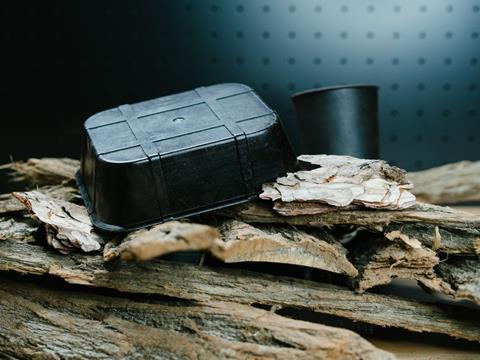
Bpacks has announced the launch of the ‘world’s first’ bark-based packaging technology, set to integrate into existing production equipment for rigid plastics and offer an alternative, low-carbon, biodegradable material.
The company explains that it can convert wood production waste into bark-based pellets or finished packaging in a process similar to that of polymers, which apparently means that additional capital investments are not required to integrate it.
The production process involves compounding, creating pellets or sheets, and then applying injection moulding or thermoforming techniques to cast the solid packaging. Compared to traditional plastic production methods, however, it is thought to emit up to six times less CO2.
Utilizing waste wood as a raw material is hoped to reduce the strain on forest resources. Annual bark production levels are currently estimated at between 300 and 400 million m3.
According to Bpacks, the resultant packaging should fully decompose in moist soil in the space of one to two months. In an active environment, it is said to compost within a week and enrich the compost with nutrients – an improvement upon biodegradable polymers like PLA or PBAT, which break down into water and carbon dioxide.
Bark extracts from various tree species are also thought to provide antimicrobial properties to a packaging material.
“Traditional bio packaging often struggles to compete with its plastic counterparts in terms of pricing and integration complexity,” said Mikhail Skalkin, co-founder and CEO of Bpacks. “Our bio-based plastic substitute can be manufactured using existing plastic production equipment, eliminating the need for plastic factories to purchase new equipment.
“This facilitates overcoming the market penetration challenges that most sustainable packaging startups are facing.
“Moreover, our packaging is 100% bio-based, with up to 75% of materials sourced from production waste. We also utilize pre-owned equipment, which helps decrease our CO2 emissions.”
Bpacks aims to ‘capture a slice’ of the $348.1 billion (€324,168,125,0000) spent by companies on plastic-based products every year with a sustainability-minded alternative. It also intends to align with EU policy directives that mandate a transition into biodegradable packaging within the next five years.
Last year, the European BeonNAT project assessed the possibility of producing bioplastics from different tree species, including poplar, elm, birch, and common juniper. These bioplastics would be used for bioactive cosmetics, biochar, activated carbon, and pet litter with essential oils.
Metsä Spring then led a pre-A funding round and raised €2 million to help Montinutra upscale its chemical-free, pressurized hot water extraction process for forest industry side streams. This process is set to produce natural biochemicals for the chemical and cosmetics sectors.
More recently, Plastpom has collaborated with scientific centres like the Gdańsk University of Technology to convert potato starch into a compostable, biodegradable material. In doing so, it hopes to lower CO2 emissions, create an energy efficient process, and reduce its environmental impact.
If you liked this story, you might also enjoy:
Report: The ultimate guide to global plastic sustainability regulation
The Brief: Oxo-(bio)degradables: the who, what, and why of breaking down fossil-based plastics
Sustainable Packaging Summit: How Kraft-Heinz uses collaboration to drive innovation
The Brief: Using ocean-bound plastic in packaging – how, why and should we?













No comments yet